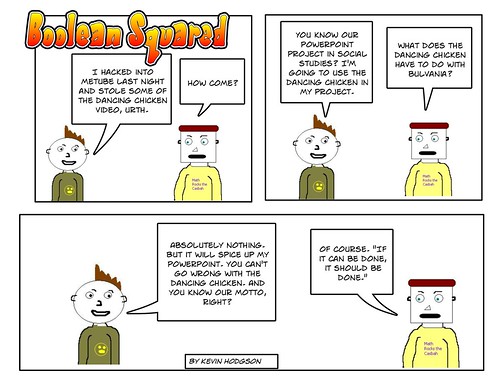
flickr photo shared by Clintus McGintus under a Creative Commons ( BY-NC-SA ) license
I was listening to George Couros on a hangout for IMMOOC, and he was telling the story (if I remember it right) of a high school student building a car, and when George asked how the young builder how he learned to do build a car, the student replied … on YouTube.
My class was waiting for dismissal on the first days of school and in the back of the room, a student pulled out a yo-yo and started to do acrobatic yo-yo-ing tricks. Where did he learn some of his more complicated moves? On YouTube.
A student once brought in video of friends skateboarding, flying across the air off ramps and other objects at the local skateboard park. The camera angles and the music and theatrical editing of the video had me asking the student, where did you learn how to shoot movies and edit like that? On Youtube.
My son wanted to hack and mod Minecraft. Where did he go to learn more about how to do that? On YouTube.
A student is very interested in anime. I mean, obsessed with the Japanese art-form. Where did they go to learn how to draw? On YouTube.
I had a plumbing issue. I am not mechanical. But this seemed fixable, and I didn’t want to pay our plumber $100 a hour for so simple a job. Where did I go to teach myself how to fix the plumbing? On YouTube.
And on and on and on … right?
Remember when schools universally blocked YouTube from student access? I hope those days are fading away. The more I talk with young people, and watch my own sons interact with the world, and reflect on how I learn new things, the more it becomes clear that YouTube has become the largest classroom in the world.

People of all sorts, in all parts of the world, are willingly sharing their expertise and creating narrow communities (what Chris Anderson called “The Long Tail” of marketing in the business world but which might have applications in thinking about students’ interests) and niche interests, and people are finding those communities more readily than ever before. Videos are a key component. Showing what you know. Sharing what you know. Learning from each other. Sure, there’s still a lot of flotsam and jetsam on YouTube (some of it wonderfully distracting) but more and more, there is amazing teaching and learning going on.
Check out Gary Haye’s Social Media Counter, and zoom in on the hours of YouTube video being uploaded in any given time. It’s staggering. In a 60 second period in which I was watching, there was nearly 400 hours of video uploaded to YouTube.
And those of us (you, me) who share their knowledge and expertise to our students in this venue are the teachers. Not necessarily us, the classroom teachers in the school building. Us, the world at large.
We openly share our knowledge with others, by pointing the camera at ourselves and saying, this is how I do it. You can, too. We learn by clicking pause, rewinding, watching again and again and again. We comment (sometimes, not so nicely, alas), and follow our “teachers” for the next video. We join communities of others with our interests, and discover new things and share what new thing we have invented or discovered or found out how to do.
Now, this is both an idealistic view of the YouTube world, and yet, the reality, too. Ask any kid. They’ll tell you. As Google seeks to monetize more and more aspects of YouTube, this might all shift to something different. For now, if you want to learn something, you don’t necessarily ask your teacher. You search YouTube.
The question is: how do we use that awareness and understanding to help our students in their own learning? I don’t think teachers and schools are obsolete, or that they even need a complete revamping. That doesn’t mean I don’t believe we don’t need change, though. The discussions in the IMOOC may give us a chance to envision the future of school, and make strides to get there.

But what if we could do a better job of teaching:
- Search Engine Queries (and Search Engine Differences … Not Everything Starts and Ends with Google)
- How Algorithyms Shape Our Internet Experience (and How to Navigate Technological Bias)
- Media Editing Techniques
- Curation of Digital Content
- How to Build an Audience
- How to Ensure a Positive Digital Footprint
- (Dare I say it) How to Make a Living off YouTube
I’m off to search YouTube for more ideas …
Peace (searching …),
Kevin
In the past few months YouTube videos have helped me see a problem of water leaking from my fridge (too complex for me to fix); a problem with my sump pump not shutting off (another problem needing a expert); a problem with carpenter ants, which I’ve reduced a bit; and a problem with my home generator not starting, and a need to clean its carburetor, which i did, twice, and it still won’t start!
I created some videos which I posted to YouTube in 2011, and have posted videos done by interns working with me, but have not ventured much into this medium in recent years.
You, Terry and others have shared plenty of videos showing me how.
Thank you for a great reflection on the power of You Tube in 21st society and how it impacts our student’s and their learning.
I like the statement you make about:
“Videos are a key component. Showing what you know. Sharing what you know. Learning from each other.”
I was inspired by @bradyvenables in today’s #IMMOOC session to incorporate ‘How to’ videos with my Year 6 class. They say learning is more powerful when you can teach/explain/justify to someone else. Oh the possibilities!